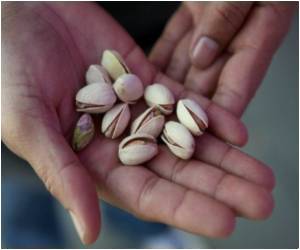People who consume pistachios, may have lower body weight and reduced risk factors for certain chronic diseases, shows recent study.

Xin Wang et al conducted a study to find out the effect of different dosages of pistachio on blood lipids, blood pressure, glucose and insulin levels and body weight in individuals with metabolic syndrome.
For the purpose of the study ninety individuals with metabolic syndrome were enrolled. According to the guidelines of the American Heart Association Step I diet, all subjects were counselled.
The subjects were randomized to eat either a higher daily serving of 70 gm pistachios (HSG), a recommended daily serving of 42 gm (RSG) or simply no pistachios (DCG) for 12 weeks.
After twelve weeks, it was found that there was no significant alteration in the BMI (Basal Metabolic Index) or body weight in the volunteers at any time during the study. There was no change in the waist-to-hip ratio among the individuals
No prominent difference was noticed in fasting glucose and two hour postprandial glucose following a 75 gram glucose challenge.
Reference:
Source-Medindia








